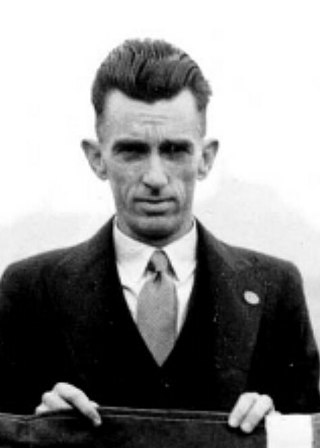Related Research Articles

Philip John Noel-Baker,Baron Noel-Baker,,born Philip John Baker,was a British politician,diplomat,academic,athlete,and renowned campaigner for disarmament. He carried the British team flag and won a silver medal for the 1500m at the 1920 Summer Olympics in Antwerp,and received the Nobel Peace Prize in 1959.
The Co-operative Party is a centre-left political party in the United Kingdom,supporting co-operative values and principles. Established in 1917,the Co-operative Party was founded by co-operative societies to campaign politically for the fairer treatment of co-operative enterprise and to elect 'co-operators' to Parliament. The party's roots lie in the Parliamentary Committee of the Co-operative Union established in 1881.
There have been various groups in Canada that have nominated candidates under the label Labour Party or Independent Labour Party,or other variations from the 1870s until the 1960s. These were usually local or provincial groups using the Labour Party or Independent Labour Party name,backed by local labour councils made up of many union locals in a particular city,or individual trade unions. There was an attempt to create a national Canadian Labour Party in the late 1910s and in the 1920s,but these were only partly successful.

James Henry Thomas was a Welsh trade unionist and Labour politician. He was involved in a political scandal involving budget leaks.

Gordon Macdonald,1st Baron Macdonald of Gwaenysgor was a British Labour Party politician and Newfoundland's final British governor as well as the last chairman of the Commission of Government serving from 1946 until the colony joined Confederation in 1949 and became a province of Canada.

Alfred John Barnes was a British Labour and Co-operative politician.

Sir Henry Keith Watson was an Australian businessman and politician. He was a leader of the Western Australian secession movement in the 1930s,holding office in the Dominion League of Western Australia. He was a prominent campaigner in the 1933 secession referendum and served on the delegation to the British parliament which ultimately failed to achieve the movement's aims. Watson later represented the Liberal Party in the Western Australian Legislative Council from 1948 to 1968. He was a tax accountant by profession and a long-serving chairman of the Perth Building Society.
Jesse Dickson Mabon,sometimes known as Dick Mabon,was a Scottish politician,physician and business executive. He was the founder of The Manifesto Group of Labour MPs,an alliance of moderate MPs who fought the perceived leftward drift of the Labour Party in the 1970s. He was a Labour Co-operative MP until October 1981,when he defected to the SDP. He lost his seat in 1983,and rejoined the Labour Party in 1991.
Thomas Edward Williams,1st Baron Williams,was a peer of the United Kingdom.
The Reverend George Saville Woods was a British Unitarian minister and Labour and Co-operative politician.

Samuel Frederick Perry,was a Labour and Co-operative politician in the United Kingdom. He was the father of the British tennis and table tennis champion Fred Perry.

Thomas Patrick Gill was a prominent member of the Irish Parliamentary Party in the late 19th and early 20th century and a Member of Parliament in the British House of Commons representing the South Louth constituency unopposed from 1885 to 1892. His uncle Peter was an unsuccessful election candidate in 1868 in County Tipperary.

Sir Henry Fildes was a Liberal Party,later National Liberal Party) and later still Liberal National Party politician in the United Kingdom. He was a member of parliament (MP) from 1920 to 1923 and from 1935 to 1945.

The National Society of Operative Printers and Assistants (NATSOPA) was a British trade union.
Samuel Phillip Viant was a British Labour Party politician.
William Hirst was a British Labour and Co-operative politician who was the Member of Parliament (MP) for Bradford South from 1924 to 1931.
Edward Frank Wise CB was a British economist,civil servant and Labour Party politician. He served as a Member of Parliament (MP) from 1929 to 1931.
Albert Law was a British Labour Party politician.
Michael Brothers was a British politician.
References
- 1 2 3 Stenton, Michael; Lees, Stephen (1979). Who's Who of British Members of Parliament. Vol. III. Brighton: Harvester Press. pp. 127–128. ISBN 0855273259.